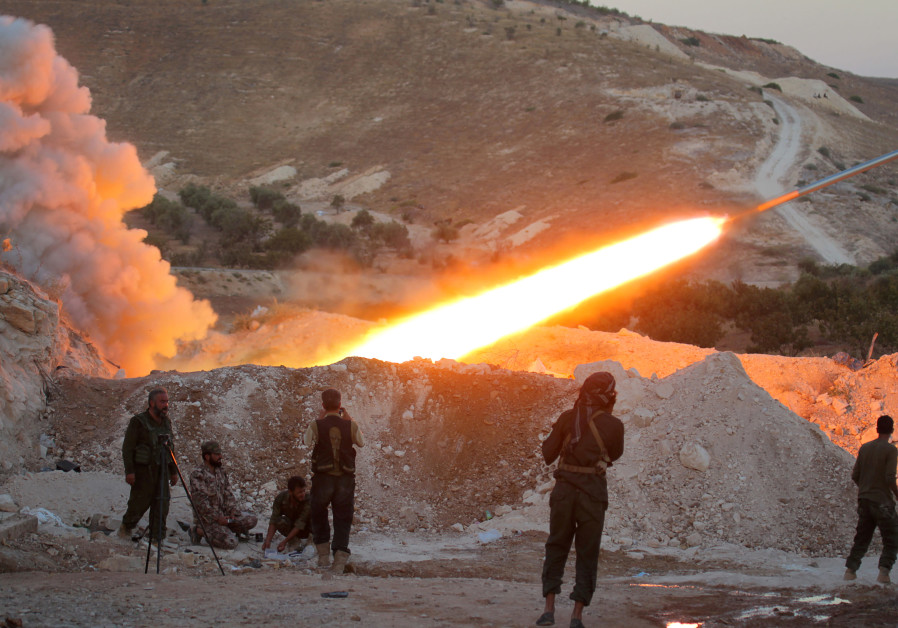Analysis: Airstrike in Damascus an embarrassment for Syrian regime at crucial time

Free Syrian Army fighters launch a Grad rocket from Halfaya town in Hama province, towards forces loyal to Syria’s President Bashar Assad stationed in Zein al-Abidin mountain, Syria September 4, 2016. . (photo credit: REUTERS/AMMAR ABDULLAH/FILE PHOTO)
Syrian air defense confronted a complex threat over Damascus Tuesday night. It comes after several months of relative quiet for Bashar al-Assad’s Syrian regime, which is grappling with a crises in eastern Syria as the US withdraws.
The airstrikes took place as the Syrian state media was seeking to highlight Christmas in Syria. Syria was witnessing a “victory over terrorism,” SANA said. However the airstrikes were the most serious since September when an Israeli airstrike targeted Latakia and resulted in Syrian air defense shooting down a Russian IL-20 aircraft. That incident caused Moscow to give Syria the S-300 system and warn Israeli “hotheads” against further incidents.
For months it has been relatively quiet. An incident on November 29 and December 9th worked up Damascus as air defenses were activated. But both incidents seemed minor. One was a false alarm apparently. However December 25 was a major escalation. It comes as Syria is seeking to deal with a major crises in eastern Syria as the US withdraws.
US President Donald Trump announced the withdrawal on December 19 and since then there have been discussions about what comes next. Turkey wants to launch a major operation into eastern Syria to strike at the Kurdish People’s Protection Units (YPG) which Ankara says are terrorists linked to the Kurdistan Workers Party (PKK). The YPG were partners of the US-led Coalition’s anti-ISIS campaign.
Syrian rebel groups aligned with Turkey have volunteered to help fight the YPG. One group already announced it would attack Manbij in northern Syria.
For the Syrian regime this is a problem because there are Syrian troops in eastern Syria in Qamishli and Hasakeh. The Syrian regime has amicable relations with the YPG but the regime must rely on Russia and Iran to help negotiate with Turkey in eastern Syria. As Damascus focuses on that, it also wanted a quiet Christmas to highlight stability after seven years of civil war. The airstrikes burst that quiet and will make Damascus wonder if worse is to come.
Israel has said it struck 200 targets in the last two years throughout Syria. Many of these were near Damascus according to local reports. But Syria thinks that the S-300 and Russia’s support will reduce the airstrikes.
Instead it appears Syria has not been successful at preventing an airstrike around Damascus. Even though its state media claims it intercepted all the missiles fired at targets near Damascus on December 25, that assertion is unlikely.
The Syrian government must now ask itself if Russia is serious about training it to use the S-300 and if the S-300 is effective.
These two issues relate to how Damascus will concentrate the challenges it still faces. Israel has said that as the US withdraws, Jerusalem will continue to challenge Iran in Syria. In addition there are reports that Russia could offer to help reduce Iranian influence or presence in Syria in return for something.
Syria’s regime looks at the region and realizes that decisions about what happens in Syria always seem to be outsourced to Moscow, Tehran or Ankara. For instance the foreign ministers of Russia, Iran and Turkey met in Geneva on December 18 to discuss a constitutional committee for Syria.
Russian defense officials visited Tehran on December 25 and Iran discussed expanding cooperation with Russia. Russia also speaks directly with Israel and reports indicate that this includes discussions about Syria.
Syria is trying to rebuild its reputation in the region. The Sudanese leader Omar Bashir went to Damascus on December 16 and Syria’s powerful intelligence chief Ali Mamluk went to Cairo on December 23. Normally that would look like Syria is coming in from the cold in the region, welcoming foreign leaders and working with Arab regimes after years of being treated like a pariah by much of the Arab League.
But Syria’s regime also wants to secure Damascus and wants to negotiate what happens in Idlib and in eastern Syria. Yet it has to rely on Russia for much of these details. It also has to rely on Russia for improving its air defenses around Damascus. The explosions and wild-firing of missiles on Tuesday illustrates that Damascus has a long way to go to confront airstrikes around its capital.
Join Jerusalem Post Premium Plus now for just $5 and upgrade your experience with an ads-free website and exclusive content. Click here>>






Comments are closed.